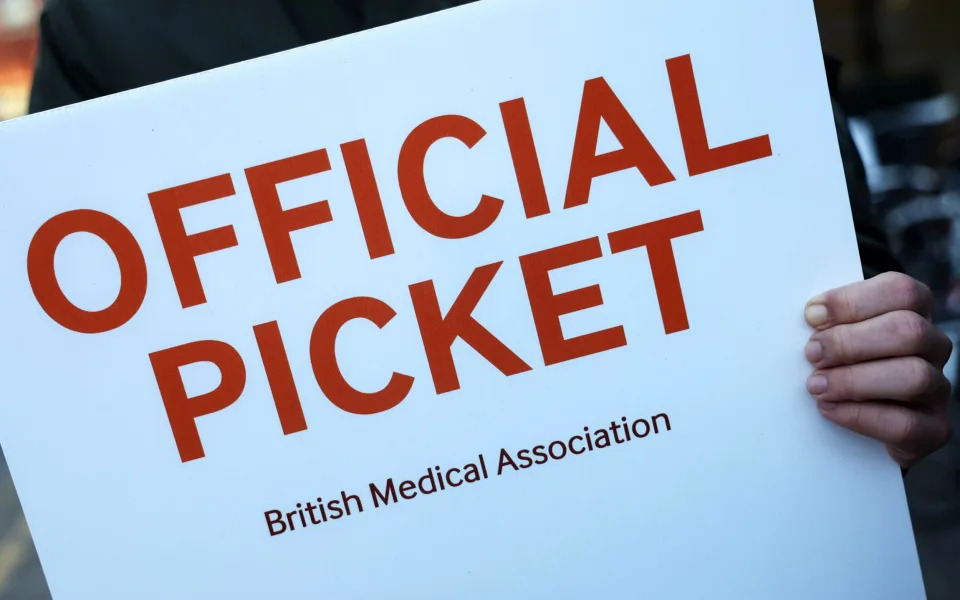Michael Searles
Fri, 5 January 2024

The British Medical Association has allowed one junior doctor to work in neonatal care for a single shift on Friday - Andy Rain/Shutterstock
A single striking junior doctor has been allowed to cross the picket line after around 30 requests by NHS medical directors were turned down.
The British Medical Association (BMA) said it had allowed one junior doctor to work in neonatal care for a single shift on Friday Jan 5, after University Hospital Lewisham, in south-east London, put in its second request for help to the union in two days.
Under strike protocols, hospital trusts can ask unions to allow doctors to return to work and cover shifts if patient safety is compromised. However, all other known requests have so far been rejected by the BMA.
Health authorities were also privately bracing for an increase in vulnerable patients arriving at hospitals this weekend, with cold weather alerts across England and temperatures set to plummet to sub-zero in some parts of the country.
The UK Health Security Agency has issued a yellow alert for cold weather across the whole of England, coming into effect on Saturday morning and lasting until Tuesday.
The health agency said the elderly, very young and other vulnerable people were “likely to struggle to cope in these conditions” and warned of an increase in hospital admissions and risk of death during the cold snap.
A surge in winter viruses ahead of the strikes resulted in more than 5,000 patients in hospital with Covid or flu as of the start of the week, according to NHS data published today.
“We have granted a derogation for one junior doctor for the neonatal unit at University Hospital Lewisham for the day shift on 5th January,” the BMA confirmed. “The trust has informed us that alternative sources of staffing have been exhausted. Our priority is patient safety.”
A spokesman for the trust said it would “do what is necessary to keep our hospitals safe” and was “pleased this had been recognised”.
But every other request to the union to allow junior doctors to return to work has been refused, with some hospitals having more than one plea turned down. Senior NHS sources said around 30 requests have been submitted as pressures mount.
Great Western Hospitals Foundation Trust, which declared an “internal incident” even before strikes were under way, was among the trusts making pleas for junior doctors to be allowed to cross the picket line.
The trust, in Swindon, Wiltshire, requested that junior doctors be allowed to work in surgery and in its outpatients’ appointments departments, in order to deal with the most urgent cases. Both requests were rejected.
A spokesman said the trust was focusing all efforts on generating bed capacity and maintaining safe staffing amid “extremely high demand for our services”.
Guy’s and St Thomas’ NHS Foundation trust in London is also understood to be among those to have had requests rejected. Other hospitals have issued pleas for the public to help “free up beds” by collecting relatives who can safely go home.

Junior doctors on a picket line at St Thomas’ Hospital, central London - Justin Tallis/AFP
South Warwickshire NHS Trust and Wrightington, Wigan and Leigh NHS Foundation Trust were among those asking for relatives to take loved ones home, and were among the four hospitals in England at full capacity ahead of the strikes.
University Hospitals Plymouth NHS Trust, which asked family members to “collect relatives who are ready to go home to free up beds” on Thursday, declared a critical incident on Friday afternoon and urged the public to only seek help with a life-threatening emergency.
The head of the trust was among those hauled in by Victoria Atkins, the Health Secretary, just before Christmas when average delays for ambulances outside A&E had reached five hours.
A row over safety protocols broke out on Wednesday night with the BMA claiming hospital medical directors and NHS officials were bowing to “political pressures” to undermine the strikes without evidence to justify their appeals.
But senior officials at NHS England responded on Thursday by setting out steps to strengthen safety protocols and log evidence of all harm occurring when such requests are rejected.
Hospitals have been told to specifically record all safety incidents during strikes “so that we can evidence harm and near misses that might have been avoided”.
No comments:
Post a Comment